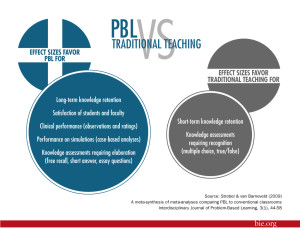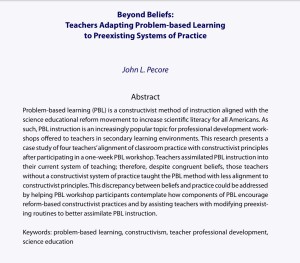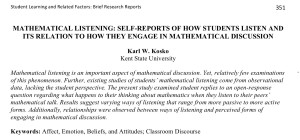Every once in a while, I am asked for either general or specific references for related research supporting or about PBL, IBL, or other types of standards-based mathematics curricula or instructional approaches. In working on my dissertation, I have found quite a large number of articles (peer-reviewed and published) that have great information about PBL in middle and high-school mathematics classes. (Please excuse any inaccuracies with MLA notation).
I’ve attempted to categorize them for you if you are interested:
General PBL and Learning with PBL
Hmelo-Silver, C. (2004). Problem-Based Learning: What and How Do Students Learn? Educational Psychology Review, 16(3). 235-266.
Hmelo-Silver, C., Golan Duncan, R., & Chinn, C.A. (2007) Scaffolding and Achievement in Problem-Based and Inquiry Learning: A Response to Kirschner, Sweller and Clark (2006). Educational Psychologist, 42(2), 99-107.
Savery, J.R. (2006). Overview of Problem-based Learning: Definitions and Distinctions. Interdisciplinary Journal of Problem-based Learning. 1(1) 9-20
Strobel, J. & von Barneveld, A. (2009) When is PBL More Effective? A Meta-synthesis of Meta-analyses Comparing PBL to Conventional Classrooms. Interdisciplinary Journal of Problem-based Learning. 3(1) 2009.

Mergendoller, J. R. , Maxwell, N. L. , & Bellisimo, Y. (2006). The Effectiveness of Problem-Based Instruction: A Comparative Study of Instructional Methods and Student Characteristics.Interdisciplinary Journal of Problem-Based Learning, 1(2).
Available at: http://dx.doi.org/10.7771/1541-5015.1026
Problems with PBL
Kirschner, P, Sweller, J & Clark, R. Why Minimal Guidance During Instruction Does Not Work: An Analysis of the Failure of Constructivities, Discovery, Problem-Based, Experiential and Inquiry-Based Teaching. Educational Psychologist, 41(2), 75-86.
Pecore, J.l. (2012) Beyond Beliefs: Teachers Adapting Problem-based Learning to Preexisting Systems of Practice. Interdisciplinary Journal of Problem-based Learning 7(2), 1-28

PBL and Achievement
Azer, S.A. (2009) Problem-based Learning in the fifth, sixth and seventh grades: Assessment of students’ perceptions. Teaching and Teacher Education 25, 1033-1042.

Ridlon, C. (2009). Learning Mathematics via a Problem-Centered Approach: A Two-Year Study. Mathematical Thinking and Learning, 11, 188-225.
Riordan, J.E. & Noyce, P.E. (2001) The Impact of Two Standards-Based Mathematics Curricula on Student Achievement in Massachusetts. Journal for Research in Mathematics Education 32 (4) 368-398.

Student Learning in a PBL Environment
Rittle-Johnson, B & Koedinger, K (2005). Designing Knowledge Scaffolds to Support Mathematical Problem Solving. Cognition and Instruction, 23 (3), 313-349.
Jonassen D.(2011). Supporting Problem Solving in PBL. Interdisciplinary Journal of Problem-based Learning, 5(2)
Kosko, K.W. (2012) Mathematical Listening: Self-Reports of How Students Listen and its Relation to How They Engage in Mathematical Discussion. Proceedings of the 34th annual meeting of PME-NA, Kalamazoo, MI: Western Michigan University.
